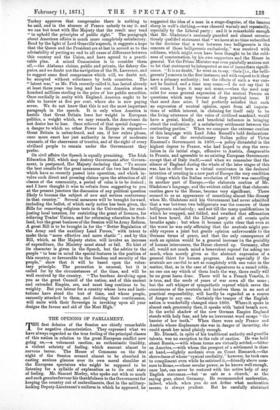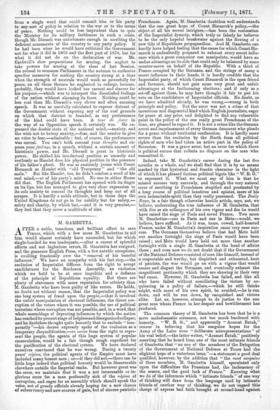THE OPENING OF PARLIAMENT.
first debates of the Session are chiefly remarkable for negative characteristics. They expressed what we have always regarded as the true feeling of the principal classes of this nation in relation to the great European conflict now going on,—a vehement caution, an enthusiastic timidity, -a violent sobriety of feeling, which amount almost to -nervous terror. The House of Commons on the first night of the Session seemed almost to be absorbed in casting anxious glances over its own moral shoulder at the European spectators who might be supposed to be listening for a syllable of explanation as to its real state -of feeling. Mr. Samuel Morley, who spoke out with so much and such genuinefervour his thankfulness to the Government for _keeping the country out of embroilmenta, that in the military- looking Deputy-Lieutenant's uniform in which he appeared, he suggested the idea of a man in a stage-disguise, of the famous sheep in wolf's clothing,—was cheered warmly and repeatedly, especially by the Liberal party ; and it is remarkable enough that Mr. Gladstone's anxiously guarded and almost ostenta- tiously qualified statement that " we have at no time subscribed to the doctrine that a war between two belligerents is the concern of those belligerents exclusively," was received with coldness, which might even have been thought to be the cold- ness of consternation, by his own supporters and the House in general. Yet the Prime Minister was even painfully anxious not to let that statement be interpreted as one of immediate signifi- cance. " It is no doubt," he went on to say, -their [i.e., the belli- gerents'] concern in the first instance; and with respect to it they have a primary authority ; but the effects of such a war can- not be limited, and a time may come,—I do not say that it will come, I hope it may not come,—when the need may exist for some general expression of the neutral Powers on questions which may become of deep practical issue. If that need does arise, I feel perfectly satisfied that such an expression of neutral opinion, apart from all imputa- tions of selfish interest, in claiming for itself only to be the living utterance of the voice of civilized mankind, would have a genial, kindly, and beneficial influence in bringing about the realization of a satisfactory settlement between the contending parties." When we compare the extreme caution of this language with Lord John Russell's bold declarations in favour of the revolutionary Italian policy of Victor Emanuel's Government in 1860,—a policy distasteful in the highest degree to France, who had hoped to stop the revo- lution in its initial stage, offensive to Austria, disagreeable to Prussia, and agreeable to no existing European Government except that of Italy itself,—and when we remember that the silence of England during the whole of the later stages of this war, has in effect been a virtual connivance in the declared intention of creating in a new part of Europe the very condition of things which the Italian revolution of 1860 was cancelling in another part of Europe,—the elaborate caution of Mr. Gladstone'a language, and the evident relief that that elaborate caution gave to the House, become very significant. There seemed to us an appearance of something almost like dismay when Mr. Gladstone said his Government had never admitted that a war between two belligerents was the concern of those belligerents exclusively ; and not till the many qualifications in which he wrapped, and folded, and swathed that affirmation had been heard, did the Liberal party at all events quite breathe again ; but when it became quite clear that even at the worst he was only affirming that the neutrals might pos- sibly express a joint but gentle opinion unfavourable to the German terms of peace, and that the only consequence of such an opinion would be a general increase in the geniality of human intercourse, the House cheered up. Germany, after all, would not much mind a benevolent reproof for asking too much, when merely given as the abstract expression of a general thirst for human progress. And especially if the neutrals are careful to act so completely with one voice in the matter, that, as in the case of the signatures to a round robin, no one can say which of them leads the way, there really will be no great harm done. There will be a French Venetia, it is true, and the seeds of years of war sown all the same ; but the soft whisper of sympathetic reproof which saves the consciences of the neutrals, and involves them in no sort of practical responsibility, will hardly be regarded as a source of danger to any one. Certainly the temper of the English nation is wonderfully changed since 1860. Where it spoke in almost rash generosity then, it speaks with 'bated breath now. In the awful shadow of the new German Empire England stands with holy fear, and lets no irreverent word escape " the barrier of her teeth." When there were only France and Austria whose displeasure she was in danger of incurring, she could speak her mind plainly enough.
Mr. Disraeli, in spite of his traditional audacity and guerilla talents, was no exception to the rule of caution. He was bold about Russia,—with whom terms are virtually settled,—bitter on America,—with whom the prospect of a settlement is close at hand,—slightly sardonic even on. Count Bismarck,—the shrewdness of whose "cynical cordiality," however, he took care to compliment even while he satirized it,—friendly above mea- sure to Rome,—whose secular power, as he knows well enough, once lost, can never be restored with the active help of any English statesman,—but as safe as a church,' as the saying goes, about Germany. He recommended moderation, indeed, which, when you do not define what moderation means, is always prudent. But he carefully abstained from a single word that could commit him or his party to any -sort of policy in relation to the war or to the terms of peace. Nothing could be less imprudent than to quiz the Ministry for its military feebleness in such a crisis, though Mr. Disraeli was unfortunate enough in ascribing the deficient armaments of the country to any party policy. If he had been wiser he would have criticized the Government not for what it did in 1869 and the first part of 1870, but for what it did not do on the declaration of war. Mr. Cardwell's slow preparations for arming, the neglect to take powers for arming at the close of last Session, the refusal to summon Parliament in the autumn to authorize speedier measures for making the country strong at a time when the strength of neutrals would work so powerfully for peace, on all these themes he neglected to enlarge, because, probably, they would have looked too earnest and sincere for his purpose,—which was to interpret the dissatisfied feelings of the nation without alarming its fears. Nothing could be less real than Mr. Disraeli's very clever and often amusing speech. It was as carefully calculated to express distrust of the Government without exposing any of the real grounds on which that distrust is founded, as any performance of the kind could have been. A tour de force in the way of an Opposition speech it certainly was. He ex- pressed the double state of the national mind,—anxiety, and the wish not to betray anxiety,—fear, and the resolve to give no voice to fear,—admirably ; but, of course, the performance was unreal. You can't both conceal your thoughts and ex- press your feelings, in a speech, without a certain amount of histrionic power, and Mr. Disraeli is great in histrionic power. He shifted his intellectual position as uneasily and restlessly as Hamlet does his physical position in the presence of his father's ghost. He was as anxiously jocose with Count Bismarck as Hamlet with " old Truepenny " and " the old mole." But like Hamlet, too, he didn't confess a word of his real mind,—or of his party's mind. No one in either House did that. The English Parliament has opened with its finger on its lips, but has managed to give very clear expression to its sole anxiety to conceal its thoughts and keep out of all scrapes., It is hardly a noble attitude, but in these days the United Kingdoms do not go in for nobility but for safety,— safety and charity, by which last,—and it is very genuine,— they feel that they cover a multitude of sins.































 Previous page
Previous page